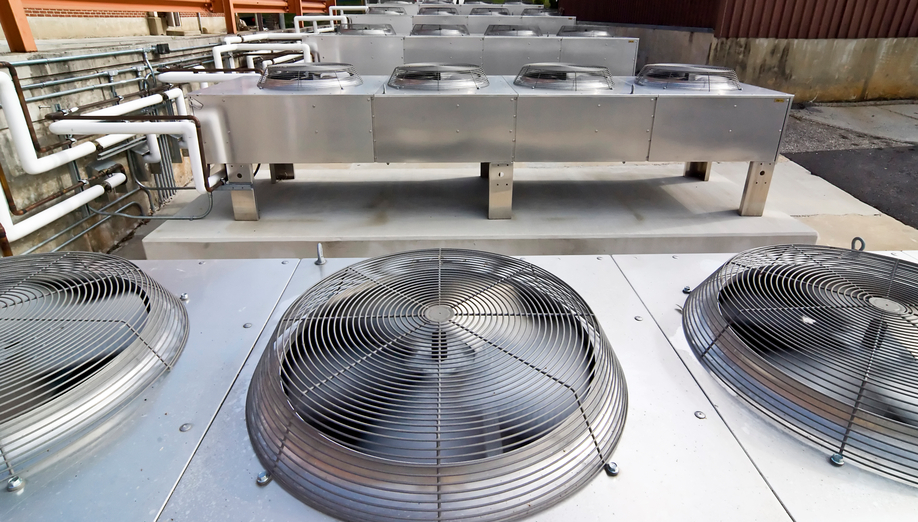Newfoundland and Labrador HVAC 42 PDH Discount Package 2
Courses in this Package
Air Conditioning with Thermal Energy Storage (M04-028)
Battery Room Ventilation and Safety (M05-021)
Alternatives to Active HVAC Systems (M06-016)
Boiler Basics, Operation and Maintenance (M08-009)
Centralized Vs. Decentralized Air Conditioning Systems (M05-012)
Overview of Chiller Compressors (M04-027)
Introduction to Refrigeration Systems (M08-008)
General Principals of Engineering Ethics for Newfoundland and Labrador Professional Engineers (NL2-001)

This online engineering PDH course provides an overview of various TES technology options and discusses their inherent pros and cons.
Thermal energy storage (TES) system is a load shifting strategy for creation of cooling to off-peak hours. In a TES system, a storage media is cooled during periods of low cooling demand and the stored cooling is used later to meet air-conditioning load or process cooling loads. Operating refrigeration chillers at night and displacing energy use from peak (day time) to off-peak periods when the energy is at a lower cost is the primary objective of TES system.
As a proven technology, chilled water or ice thermal storage systems supply the desired reliability for high air conditioning availability during peak hours and can substantially cut operating costs and reduces capital outlays when systems are suitably designed. It offers building owners the potential for substantial operating cost savings by using off-peak electricity to produce chilled water or ice for use in cooling during peak-hours.
This 4 PDH online course is applicable to architects, air-conditioning engineers, controls engineers, contractors, environmentalists, energy auditors and loss prevention professionals. It is assumed that all the readers know the basic functioning of the air conditioning system.
This P.Eng. continuing education course is intended to provide you with the following specific knowledge and skills:
- Overview of thermal energy storage systems
- Understanding chilled water storage systems
- Understanding ice thermal storage systems
- Selecting a right TES system
- Familiarizing with district cooling system
In this professional engineering CEU course, you need to review the course document titled, "Air Conditioning with Thermal Energy Storage".
Upon successful completion of the quiz, print your Certificate of Completion instantly. (Note: if you are paying by check or money order, you will be able to print it after we receive your payment.) For your convenience, we will also email it to you. Please note that you can log in to your account at any time to access and print your Certificate of Completion.

This online engineering PDH course describes the hazards associated with batteries and highlights those safety features that must be taken into consideration when designing, constructing and fitting out a battery room. It is only for reference and anyone using this course should rely on state and local codes that may apply. Advice on specific ventilation rates required must be sought from the battery suppliers.
It is common knowledge that lead-acid batteries release hydrogen gas that can be potentially explosive. The battery rooms must be adequately ventilated to prohibit the build-up of hydrogen gas. During normal operations, off gassing of the batteries is relatively small. However, the concern is elevated during times of heavy recharge of the batteries, which occur immediately following a rapid and deep discharge.
Often the worst case scenario for dangerous hydrogen accumulation is underestimated. But dismissing such a critical safety issue is not a safe or responsible way to deal with it. Instead, engineers should be prepared to face the likely possibility of hydrogen build up, clearly identify the conditions when the risk is highest, and design systems that protect us from explosive levels in a fail-safe way.
This 5 PDH online course is intended for HVAC designers,architects, loss prevention engineers, facility maintenance personnel, environmentalists, energy auditors as well as consultants and contractorsinterested in gaining an understanding of cost effective ventilation.
This P.Eng. continuing education course is intended to provide you with the following specific knowledge and skills:
- Describing the construction, function and operation of a Lead Acid battery
- Defining battery capacity i.e. ‘Amp Hour Rate’ or ‘Reserve Capacity’ voltage
- Explaining the differences between vented lead acid and sealed VRLA batteries
- Explaining the rules and regulations provided by IEEE, OSHA, NEC, UBC and DOT
- Determining the ventilation requirements for a battery room for hydrogen and fume extraction
- Describing the battery maintenance, testing and charging practices
- Describing the dangers and the Health and Safety precautions associated with the lead acid battery, its service, as well as its use and component materials
In this professional engineering CEU course, you need to review the course document titled, “Battery Room Ventilation and Safety”.
Once you complete your course review, you need to take a multiple-choice quiz consisting of twenty five (25) questions to earn 5 PDH credits. The quiz will be based on this course document.
Upon successful completion of the quiz, print your Certificate of Completion instantly. (Note: if you are paying by check or money order, you will be able to print it after we receive your payment.) For your convenience, we will also email it to you. Please note that you can log in to your account at any time to access and print your Certificate of Completion.

This online engineering PDH course presents passive cooling systems which provide guidelines on choosing the proper technologies suitable to different situations.
Buildings are major consumers of energy insofar as their construction, operation and maintenance are concerned. It is estimated that almost 50% of the global energy demand is due to buildings with active HVAC equipment being the highest contributor. Thus, the energy conscious architecture has evolved to address these issues. It involves the use of eco-friendly and less energy intensive building materials, incorporation of passive cooling techniques in building design and integration of renewable energy technologies.
Passive cooling methods maximize the efficiency of the building envelope by minimizing heat gain from the external environment and facilitate cooling by air movement, ventilation, night cooling, evaporation, desiccant dehumidification and earth coupling to name a few. All these techniques require little or no input of electrical energy. Even when these alternatives cannot avoid the use of compressive cooling systems completely, their role can optimize the energy consumption and the peak electric load.
This 6 PDH online course is aimed at students, mechanical engineers, architects, facility managers, environmentalists, energy auditors and anyone interested in gaining a basic understanding of cooling systems.
This P.Eng. continuing education course is intended to provide you with the following specific knowledge and skills:
- Understanding the factors having greatest impact on summer cooling loads
- Understanding the mechanisms of heat gain control by intervening solar radiation, vegetation, ventilation and internal heat gains
- Learning the principles of natural ventilation design in night cooling
- Understanding the design factors for stack and wind driven ventilation
- Learning the basic principles of direct and indirect evaporative cooling systems
- Understanding the factors affecting evaporation rate and cooling
- Learning the principles of desiccant cooling and dehumidification
- Knowing the performance of an absorption chiller system v/s vapor compression cycle
- Understanding the various radiant cooling strategies
- Understanding the fundamentals of direct ground cooling systems and geothermal heat pumps
In this professional engineering CEU course, you need to review the course document titled, "Alternatives to Active HVAC Systems".
Upon successful completion of the quiz, print your Certificate of Completion instantly. (Note: if you are paying by check or money order, you will be able to print it after we receive your payment.) For your convenience, we will also email it to you. Please note that you can log in to your account at any time to access and print your Certificate of Completion.

This online engineering PDH course provides information on steam generation, types of boilers pertinent to engineering operations, and the various fittings and components commonly found on boilers.
The boiler is an enclosed vessel in which water is heated and circulated, either as hot water or steam, to produce a source for either heat or power. A central heating plant may have one or more boilers that use gas, oil, or coal as fuel. The steam generated is used to heat buildings, provide hot water, and provide steam for cleaning, sterilizing, cooking, and laundering operations. Small package boilers also provide steam and hot water for small buildings.
A boiler must also meet certain requirements before it is considered satisfactory for operation. The boiler must be safe and economical to operate, and it must be able to generate steam at the desired rate and pressure.
This 8 PDH online course is applicable to mechanical engineers and professionals who are interested in learning more about the operation, maintenance, and repair of boilers used in various engineering applications.
This P.Eng. continuing education course is intended to provide you with the following specific knowledge and skills:
- Familiarizing with the steam generation theory
- Understanding boiler design requirements
- Learning about the different types of boilers, their fittings and accessories
- Identifying the automatic controls associated with boilers
- Learning about the different types of instruments and meters
- Knowing the procedures associated with boiler water treatment and cleaning
- Gaining an overview of the procedures associated with boiler maintenance
Upon successful completion of the quiz, print your Certificate of Completion instantly. (Note: if you are paying by check or money order, you will be able to print it after we receive your payment.) For your convenience, we will also email it to you. Please note that you can log in to your account at any time to access and print your Certificate of Completion.

This online engineering PDH course discusses the various issues to be considered and the questions to be raised before an intelligent, well-thought HVAC scheme is finalized. The distinction between 'central' and local floor-by-floor 'compact' systems is critical from an architectural perspective and shall serve the primary theme for this course.
Successful Heating, Ventilating, and Air Conditioning (HVAC) systems are the key to successful buildings. Because each building is different, it is very important to choose a system that is right for the facility. Proper selection of the HVAC system is a crucial decision for any new project and the decision depends upon a number of factors like how large area needs to be cooled, what is the application, what kind of total heat is generated inside the enclosed area, the developer's preference - initial installation cost, aesthetics, and long term maintenance and life cycle costs etc etc. The HVAC engineer would consider all the related parameters and suggest the system most suitable for your space.
Many different HVAC systems are available today but the design and selection of right HVAC system must combine a proper choice of engineered products efficiently providing conditioned air to the space at optimum energy while adding architectural features which complement the interior design.
This 5 PDH online course is applicable to all mechanical engineers, design professionals, operations and maintenance personnel, as well as consultants and contractors who construct, build and manage mechanical building systems.
This P.Eng. continuing education course is intended to provide you with the following specific knowledge and skills:
- Understanding the different types of HVAC systems
- Understanding the HVAC design challenges on various architectural and functional parameters
- Understanding the difference between central and decentralized systems
- Understanding the central chilled water system sub-configurations
- Understanding the various types of decentralized systems (window, split, package, heat pumps and VRF systems)
- Understanding the pros and cons of the central and compact systems
- Understanding how to select the right system for your application
In this professional engineering CEU course, you need to review the course document titled "Centralized Vs Decentralized Air Conditioning Systems".
Upon successful completion of the quiz, print your Certificate of Completion instantly. (Note: if you are paying by check or money order, you will be able to print it after we receive your payment.) For your convenience, we will also email it to you. Please note that you can log in to your account at any time to access and print your Certificate of Completion.

This online engineering PDH course provides comprehensive information on the chiller compressors. It addresses the key issues pertaining to the chiller compressor selection and their applications. The practical considerations and assessment criterion are also discussed in brief.
In HVAC industry, the refrigeration machine that produces chilled water is referred to as a "chiller". The majority of installations operating worldwide are based on the vapor compression chillers that use mechanical energy in the form of electric motor to drive the cooling cycle. The vapor compression chiller packages are generally classified by 4 types of compressors namely centrifugal, reciprocating, screw and scroll.
This 4 PDH online course is applicable to HVAC engineers, facility engineers, architects, environmentalists, operations and maintenance personnel, as well as consultants and contractors who construct, build and manage facilities.
This P.Eng. continuing education course is intended to provide you with the following specific knowledge and skills:
- Operating principle of reciprocating, screw, centrifugal and scroll compressors
- Key advantages, disadvantages, limitations and drawbacks of various refrigeration compressors
- Efficiency ratings of various chiller options on peak load and part load
- Factors affecting the efficiency of chiller compressors
- Types of refrigerants used/recommended
- Heat rejection options - air cooled vs. water cooled chillers
- Reliability, maintenance, field serviceability of various chiller options
- ARI standard 550/590 performance standard for defining part load performance ratings - IPLV vs. NPLV
- Importance of peak load and part load analysis in determining the overall capacity and number of chillers
- Series and parallel arrangement of chillers
- Operational regimes, infrastructural availability and physical attributes affecting the selection of chillers
- Procurement strategies, performance specifications, life cycle cost considerations
In this professional engineering CEU course, you need to review the document titled, "Overview of Compressor Chillers".
Upon successful completion of the quiz, print your Certificate of Completion instantly. (Note: if you are paying by check or money order, you will be able to print it after we receive your payment.) For your convenience, we will also email it to you. Please note that you can log in to your account at any time to access and print your Certificate of Completion.

This online engineering course provides necessary information to understand the principles and theory of refrigeration, the components of mechanical refrigeration systems, and the types of refrigerants and associated equipment. This course also discusses the methods used for installing, maintaining, and repairing refrigeration equipment, including domestic refrigerators and freezers.
Refrigeration is the process of removing heat from an area or a substance. It is usually done by an artificial means of lowering the temperature, such as by the use of ice or mechanical refrigeration, which is a mechanical system or apparatus, designed and constructed to transfer heat from one substance to another.
This 8 PDH online course is intended for HVACR, mechanical and industrial engineers, manufacturers, maintenance staff, and others seeking a basic understanding of refrigeration systems.
This P.Eng. continuing education course is intended to provide you with the following specific knowledge and skills:
- Understanding the physics behind heat and refrigeration
- Learning about the refrigeration cycle and its different mechanical components
- Familiarizing with the different types of refrigerants
- Understanding the safety precautions associated with refrigerants
- Familiarizing with the different types of refrigerant equipment
- Understanding the installation procedures for refrigerant equipment
- Learning about the maintenance, service, and repair procedures associated with refrigerant equipment
Upon successful completion of the quiz, print your Certificate of Completion instantly. (Note: if you are paying by check or money order, you will be able to print it after we receive your payment.) For your convenience, we will also email it to you. Please note that you can log in to your account at any time to access and print your Certificate of Completion.

This online engineering PDH ethics course is (1) the study of moral issues and decisions confronting individuals and organizations involved in engineering and (2) the study of related questions about moral conduct, character, ideals and relationships of peoples and organizations involved in technological development (Martin and Schinzinger, Ethics in Engineering).
This course will address the principles of engineering ethics that every engineer is expected to live by when practicing their profession. This course also provides a general overview on PEGNL’s procedure of filing an allegation, its resolution by Registrar and its referral to Complaints Authorization Committee. It will also present unique ethical case studies randomly selected to demonstrate ethical challenges for professional engineers and alternatives to address these challenges.
This 2 PDH online course is applicable to Professional Engineers licensed in the Province of Newfoundland and Labrador and who are required to demonstrate continuing professional competency in ethical practice as a condition of their license renewal. For each renewal period, every licensee must complete at least two (2) professional development hours relative to the principals of professional responsibility, conduct and ethics.
This P.Eng. continuing education course is intended to provide you with the following specific knowledge and skills:
- Understanding the definition of engineering ethics
- Learning about the important principles of the Engineer’s Professional Responsibility
- Gaining a general overview on P.Eng.GNL’s procedure of filing an allegation, its resolution by Registrar and its referral to Complaints Authorization Committee (CAC)
- Understanding Complaints Authorization Committee (CAC) Process
- Familiarizing with the professional conduct procedure of a hearing by an adjudication tribunal
- Understanding professional ethical practices through presenting realistic case studies
Upon successful completion of the quiz, print your Certificate of Completion instantly. (Note: if you are paying by check or money order, you will be able to print it after we receive your payment.) For your convenience, we will also email it to you. Please note that you can log in to your account at any time to access and print your Certificate of Completion.